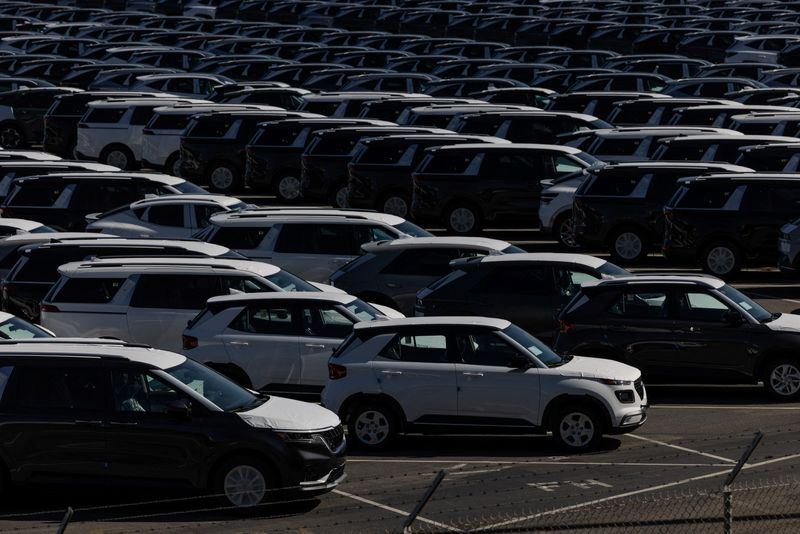US rules could force early production halt to some gas vehicles -letter
2023.12.15 15:44

© Reuters. FILE PHOTO: New vehicles are seen at a parking lot in the Port of Richmond, at the bay of San Francisco, California June 8, 2023. REUTERS/Carlos Barria/File Photo
By David Shepardson
WASHINGTON (Reuters) -A group representing major automakers urged the Biden administration to make significant changes to three proposed vehicle rules, warning they could force car companies to hastily stop building some gas-powered vehicles.
The administration has proposed, among others, stringent rules that it estimates would result in 67% of new vehicles being electric by 2032.
The Alliance for Automotive Innovation, in a previously unreported letter to three cabinet agencies and the White House dated Wednesday and seen by Reuters, warned the proposed rules “could prematurely force abandonment of many internal combustion engine vehicles and their associated revenue, reducing the availability of capital necessary for automakers to fund the EV transition.”
The agencies and White House did not immediately respond to requests for comment.
The alliance represents General Motors (NYSE:), Toyota Motor (NYSE:), Volkswagen (ETR:), Ford Motor (NYSE:), Stellantis (NYSE:) and others,
Automakers have been sounding the alarm about rules proposed by the Environmental Protection Agency (EPA), National Highway Traffic Safety Administration (NHTSA) and Energy Department, warning they could result in $14 billion in Corporate Average Fuel Economy (CAFE) fines, including $6.5 billion for GM and $3 billion for Stellantis.
The letter, signed by Alliance CEO John Bozzella, said the final rules expected in early 2024 will “effectively lock in the pace of automotive electrification.”
He cited the “critical need” for government wide coordination at the most senior levels, and questioned if “substantive work to revise the proposed rulemakings” was taking place in any meaningful way.
GM CEO Mary Barra met with White House Chief of Staff Jeff Zients and environmental adviser Ali Zaidi on Wednesday, sources told Reuters, and they discussed a number of issues including vehicle regulations.
In a previously unreported meeting, EPA Administrator Michael Regan met with the auto alliance on Nov. 29, newly released records show.
The EPA has proposed requiring 56% cuts in vehicle emissions by 2032, resulting in 67% of new vehicles being electric by 2032.
NHTSA in July proposed hiking CAFE standards by 2032 to a fleet-wide average of 58 miles per gallon by boosting requirements 2% per year for passenger cars and 4% annually for pickup trucks and SUVs. U.S. automakers want the increase for trucks cut to 2% annually.
Referring to “overlapping, duplicative and sometimes conflicting objectives” in the rules, Bozzella also said that the Energy Department’s proposed revision of EV compliance value calculations for NHTSA’s CAFE program would devalue EV fuel economy by 72%.
The DOE proposal jeopardizes Biden’s goal of 50% EV sales by 2030, Bozzella added, warning the rules could also “lead to investment decisions that move capital away from innovative EV technologies toward mature internal combustion technologies.”
GM and Ford have in recent months slowed the pace of some EV production. Republicans in Congress are pushing to block EV regulations.








